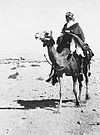Seven Pillars of Wisdom
(p. 21) Seven Pillars of Wisdom is an autobiographical account of his experiences during the Arab Revolt of 1916–1918, when Lawrence was based in Wadi Rum in Jordan as a member of the British Forces.Many sites inside the Wadi Rum area have been named after Lawrence to attract tourists, although there is little or no evidence connecting him to any of these places, including the rock formations near the entrance now known as "The Seven Pillars".[5] Some Englishmen, of whom Kitchener was chief, believed that a rebellion of Arabs against Turks would enable England, while fighting Germany, simultaneously to defeat Turkey.By mid-1922, Lawrence was in a state of severe mental turmoil: the psychological after-effects of war were taking their toll, as were his exhaustion from the literary endeavours of the past three years, his disillusionment with the settlement given to his Arab comrades-in-arms, and the burdens of being in the public eye as a perceived "national hero".Concerned over his mental state and eager for his story to be read by a wider public, his friends persuaded him to produce an abridged version of Seven Pillars, to serve as both intellectual stimulation and a source of much-needed income.In a chapter of the 1922 Oxford text not included in the subscriber's edition, Lawrence expresses in a heartfelt tone his feeling of shame at how the revolt was betrayed by the colonial powers (France and United Kingdom) with the secret Sykes-Picot agreement for the partition of the Middle East.Lawrence was killed in a motorcycle accident in May 1935, at age 46; within weeks of his death, the 1926 abridgement, as well as the first unabridged US edition by Doubleday, Doran & Company, Inc., were released to the general public.The diplomat and academic Charles Hill has called Seven Pillars "a novel traveling under the cover of autobiography", capturing Lawrence's highly personal version of the historical events described in the book.In Tony Parsons’ novel, The Murder Bag (2014), the Seven Pillars is referenced as part of the curriculum at Potters Field school, and has a formative influence on a group of former pupils.

The Great War (Sabaton album)The 2½ Pillars of WisdomscimitarsT. E. LawrenceautobiographicalBritish Armymilitary advisorBedouinArab RevoltOttoman EmpireBook of ProverbsKing James VersionFirst World WarMiddle EastReading railway stationWadi RumJordanEmir FaisalDamascusPeace ConferenceHarry Ransom CenterJeddahOxford TimesBodleian LibraryRoyal Air ForceThe MintRoyal Tank CorpssubscribersSykes-Picot agreementHerbert John HodgsonEric KenningtonAugustus JohnPaul NashBlair Hughes-StantonGertrude HermesguineaRobert GravesE. M. ForsterGeorge Bernard ShawEdward GarnettJeremy WilsonCharles HillWinston ChurchillLawrence of ArabiaAcademy AwardsBest PictureSabatonThe Great WarTony ParsonsLawrence, T. E.SmyrnaConstantinopleBeyroutAleppoMedinaGravesR. V. BuxtonGraves, R.Jonathan CapeWilson, J.Hill, C.The TimesThe ObserverGraves, RobertWilson, JeremyWilliam HeinemannStandard EbooksFaded PageProject Gutenberg AustraliaLibriVoxSir Thomas Chapman, 7th BaronetA. W. LawrenceBattle of AqabaLowell ThomasToo True to Be GoodLawrence After Arabia
